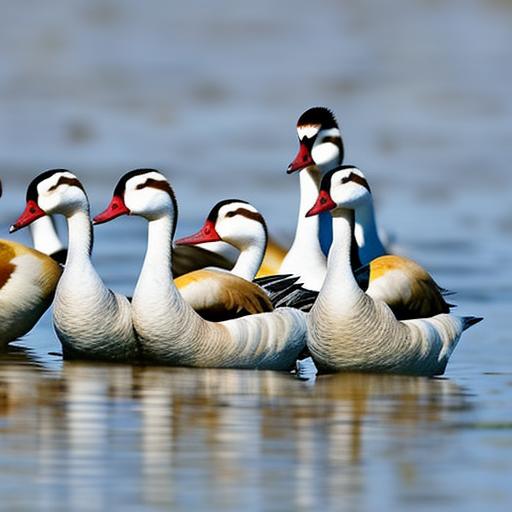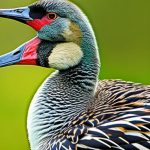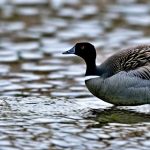Breeding Chinese geese can be a rewarding and profitable endeavor, but it requires a good understanding of the breeding season and the specific needs of these birds. Chinese geese are known for their excellent egg-laying abilities and make great parents, making them a popular choice for breeders. The breeding season for Chinese geese typically begins in late winter or early spring, when the days start to get longer and the weather begins to warm up. During this time, the geese will start to exhibit mating behaviors and the females will begin to lay eggs. It’s important for breeders to understand the natural breeding cycle of Chinese geese in order to maximize their breeding success.
During the breeding season, male Chinese geese will become more aggressive and territorial as they compete for the attention of the females. They will often engage in elaborate courtship displays, such as head bobbing and honking, to attract a mate. Female geese will also become more vocal and may start to build nests in preparation for laying eggs. It’s important for breeders to be aware of these behaviors and provide a calm and stress-free environment for their geese to encourage successful breeding. Understanding the natural instincts and behaviors of Chinese geese during the breeding season is crucial for breeders to effectively manage and support the breeding process.
Choosing the Right Breeding Stock
Selecting the right breeding stock is essential for a successful Chinese geese breeding season. When choosing breeding geese, it’s important to select birds that are healthy, strong, and have good breeding characteristics. Look for geese that are of good size and weight, with well-proportioned bodies and strong legs. It’s also important to choose geese that have a good temperament and are not overly aggressive, as this can lead to problems during the breeding season. Additionally, consider the breeding history of the geese and select birds that come from good breeding lines with a track record of successful reproduction.
It’s also important to consider the age of the breeding stock. Chinese geese typically reach sexual maturity at around 6-9 months of age, so it’s best to select breeding stock that is at least one year old to ensure they are fully mature and ready to breed. When choosing breeding stock, it’s also important to consider genetic diversity and avoid inbreeding. Inbreeding can lead to genetic defects and health problems in the offspring, so it’s important to select breeding stock from different bloodlines to maintain genetic diversity within the flock. By carefully selecting the right breeding stock, breeders can set the stage for a successful and productive breeding season.
Creating the Ideal Breeding Environment
Creating the ideal breeding environment is crucial for the success of a Chinese geese breeding season. Geese are naturally outdoor birds and require plenty of space to roam and forage, so it’s important to provide a spacious and secure outdoor area for breeding geese. The breeding environment should be free from predators and have access to fresh water for drinking and bathing. It’s also important to provide nesting areas for the geese, such as straw-filled shelters or nesting boxes, where they can lay and incubate their eggs in peace.
In addition to providing a suitable outdoor environment, it’s also important to provide a comfortable and secure indoor space for the geese, especially during the breeding season. This indoor space can be used for nesting, egg-laying, and incubating eggs, and should be well-ventilated and free from drafts. It’s important to keep the indoor space clean and dry to prevent the spread of disease and ensure the health and well-being of the breeding geese. By creating the ideal breeding environment, breeders can provide their geese with the best possible conditions for successful breeding and reproduction.
The Importance of Nutrition for Breeding Geese
Proper nutrition is essential for the health and reproductive success of breeding geese. During the breeding season, geese have increased nutritional needs to support egg production, incubation, and caring for their young. It’s important to provide breeding geese with a balanced diet that is high in protein, vitamins, and minerals to support their reproductive health. A diet that is rich in nutrients will help to ensure that the geese are in optimal condition for breeding and will help to support healthy egg production and strong, healthy goslings.
During the breeding season, it’s important to provide breeding geese with a diet that is high in protein to support egg production and the growth of the developing embryos. Good sources of protein for breeding geese include high-quality poultry feed, as well as fresh greens, insects, and other natural sources of protein. It’s also important to provide breeding geese with access to calcium to support the formation of strong eggshells. This can be provided in the form of crushed oyster shells or limestone grit, which can be offered free-choice to the geese. In addition to protein and calcium, it’s important to provide breeding geese with a balanced diet that includes a variety of grains, fruits, and vegetables to ensure they are getting all the essential nutrients they need for reproductive success. By providing breeding geese with a nutritious and well-balanced diet, breeders can help to support the health and reproductive success of their geese during the breeding season.
Recognizing the Signs of Mating and Egg Laying
During the breeding season, it’s important for breeders to be able to recognize the signs of mating and egg laying in their Chinese geese. Male geese will often become more aggressive and territorial as they compete for the attention of the females. They will engage in elaborate courtship displays, such as head bobbing and honking, to attract a mate. Female geese will also become more vocal and may start to build nests in preparation for laying eggs. It’s important for breeders to be aware of these behaviors and provide a calm and stress-free environment for their geese to encourage successful breeding.
Once the geese have mated, the female will begin to lay eggs. Chinese geese are known for their excellent egg-laying abilities and will typically lay a clutch of 5-12 eggs. It’s important for breeders to provide nesting areas for the geese, such as straw-filled shelters or nesting boxes, where they can lay and incubate their eggs in peace. It’s also important to collect the eggs regularly to prevent them from being damaged or eaten by predators. By recognizing the signs of mating and egg laying, breeders can provide the necessary support and care for their geese during the breeding season.
Incubating and Hatching Goose Eggs
Once the eggs have been laid, it’s important to provide the right conditions for incubating and hatching goose eggs. Chinese geese are excellent parents and will often take on the responsibility of incubating and hatching their own eggs. However, in some cases, breeders may choose to remove the eggs and incubate them artificially to increase the chances of successful hatching. If artificial incubation is chosen, it’s important to provide the right conditions for the eggs to develop and hatch successfully.
The ideal temperature for incubating goose eggs is around 99.5 degrees Fahrenheit, with a relative humidity of around 55-60%. It’s important to provide a stable and consistent temperature and humidity throughout the incubation period to ensure the eggs develop properly. It’s also important to turn the eggs regularly to prevent the embryos from sticking to the inside of the shell and to promote even development. The incubation period for goose eggs is around 28-30 days, and it’s important to monitor the eggs closely during this time to ensure they are developing properly. Once the eggs start to hatch, it’s important to provide a warm and safe environment for the goslings to dry off and rest before introducing them to their parents. By providing the right conditions for incubating and hatching goose eggs, breeders can increase the chances of successful hatching and the healthy development of the goslings.
Caring for Goslings
Once the goslings have hatched, it’s important to provide them with the right care and support to ensure their health and well-being. Chinese geese are excellent parents and will often take on the responsibility of caring for their young. However, it’s important for breeders to provide a safe and comfortable environment for the goslings and to monitor their health and development closely. It’s important to provide the goslings with access to fresh water for drinking and bathing, as well as a balanced diet that is high in protein and essential nutrients to support their growth and development.
It’s also important to provide the goslings with a warm and secure environment to protect them from predators and the elements. This can be achieved by providing a brooder or shelter that is well-ventilated and free from drafts, as well as access to heat lamps or other sources of warmth. It’s important to monitor the goslings closely for signs of illness or distress and to provide any necessary medical care or support. By providing the right care and support for the goslings, breeders can help to ensure their health and well-being during the early stages of their development.
Managing the Breeding Season for Success
Managing the breeding season for Chinese geese requires careful planning and attention to detail. It’s important to provide the right conditions for breeding, including a suitable breeding environment, proper nutrition, and the necessary support and care for the geese. It’s also important to monitor the geese closely for signs of mating, egg laying, and incubation, and to provide any necessary support or intervention to ensure the success of the breeding season.
It’s also important to manage the breeding season to ensure the health and well-being of the breeding stock. This includes providing regular health checks and vaccinations, as well as monitoring the geese for signs of illness or distress. It’s also important to provide the geese with access to fresh water, clean bedding, and a balanced diet to support their reproductive health and overall well-being. By managing the breeding season effectively, breeders can increase the chances of successful breeding and the production of healthy goslings.
Addressing Common Breeding Challenges
Breeding Chinese geese can come with its own set of challenges, and it’s important for breeders to be prepared to address these challenges as they arise. Common breeding challenges for Chinese geese may include infertility, egg binding, and poor hatching rates. It’s important for breeders to be aware of these potential challenges and to take proactive measures to address them.
Infertility in breeding geese can be caused by a variety of factors, including age, genetics, and environmental conditions. It’s important to provide the geese with a suitable breeding environment and to monitor their health and reproductive behavior closely. If infertility is suspected, it’s important to seek the advice of a veterinarian to determine the underlying cause and to develop a plan for addressing the issue.
Egg binding is another common challenge for breeding geese, especially in older or overweight birds. Egg binding occurs when a goose is unable to lay an egg, often due to a lack of calcium or other nutrients. It’s important to provide breeding geese with a balanced diet that is high in calcium and other essential nutrients to support healthy egg production. It’s also important to monitor the geese closely for signs of egg binding and to provide any necessary medical care or support to help the goose lay the egg successfully.
Poor hatching rates can also be a challenge for breeding geese, and may be caused by a variety of factors, including improper incubation conditions, genetic defects, or illness. It’s important to provide the right conditions for incubating and hatching goose eggs, and to monitor the eggs closely for signs of development. If poor hatching rates are observed, it’s important to seek the advice of a veterinarian to determine the underlying cause and to develop a plan for addressing the issue. By being prepared to address common breeding challenges, breeders can increase the chances of successful breeding and the production of healthy goslings.
Maximizing Your Chinese Geese Breeding Season
Breeding Chinese geese can be a rewarding and profitable endeavor, but it requires careful planning and attention to detail. By understanding the breeding season and the specific needs of Chinese geese, selecting the right breeding stock, creating the ideal breeding environment, providing the necessary nutrition and support, and managing the breeding season effectively, breeders can increase the chances of successful breeding and the production of healthy goslings. By being prepared to address common breeding challenges and providing the necessary care and support for the geese, breeders can maximize their Chinese geese breeding season and achieve their breeding goals. With the right knowledge and support, breeding Chinese geese can be a fulfilling and successful venture for breeders of all experience levels.
Meet Walter, the feathered-friend fanatic of Florida! Nestled in the sunshine state, Walter struts through life with his feathered companions, clucking his way to happiness. With a coop that’s fancier than a five-star hotel, he’s the Don Juan of the chicken world. When he’s not teaching his hens to do the cha-cha, you’ll find him in a heated debate with his prized rooster, Sir Clucks-a-Lot. Walter’s poultry passion is no yolk; he’s the sunny-side-up guy you never knew you needed in your flock of friends!







